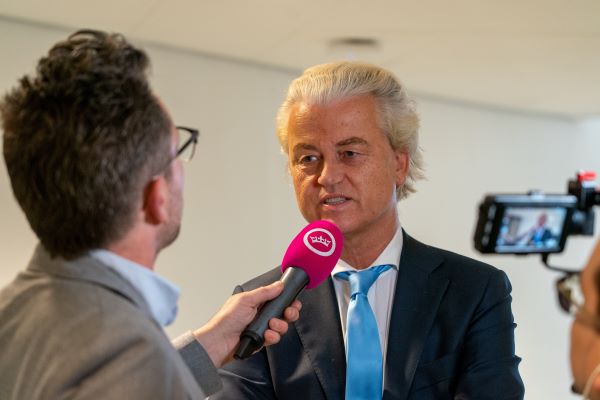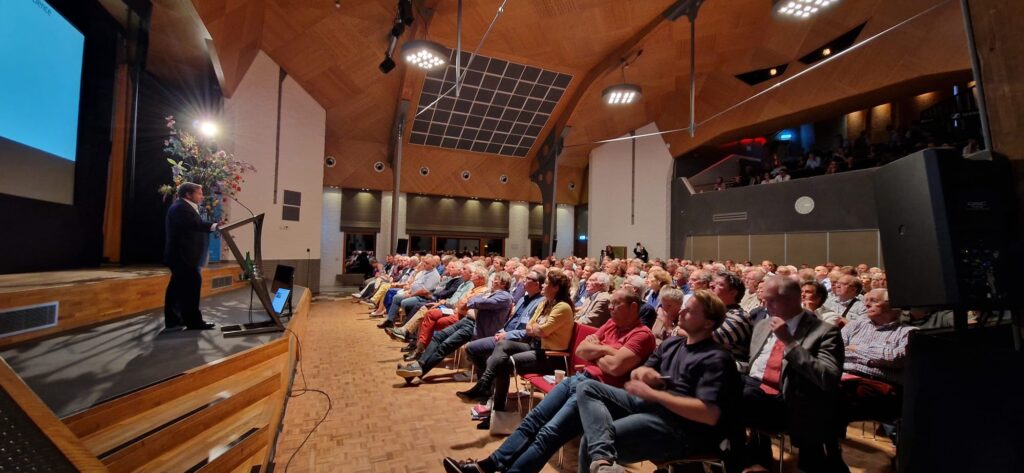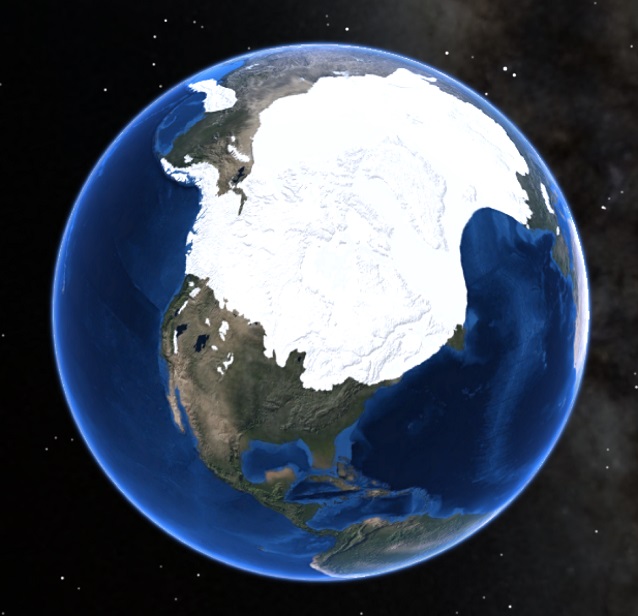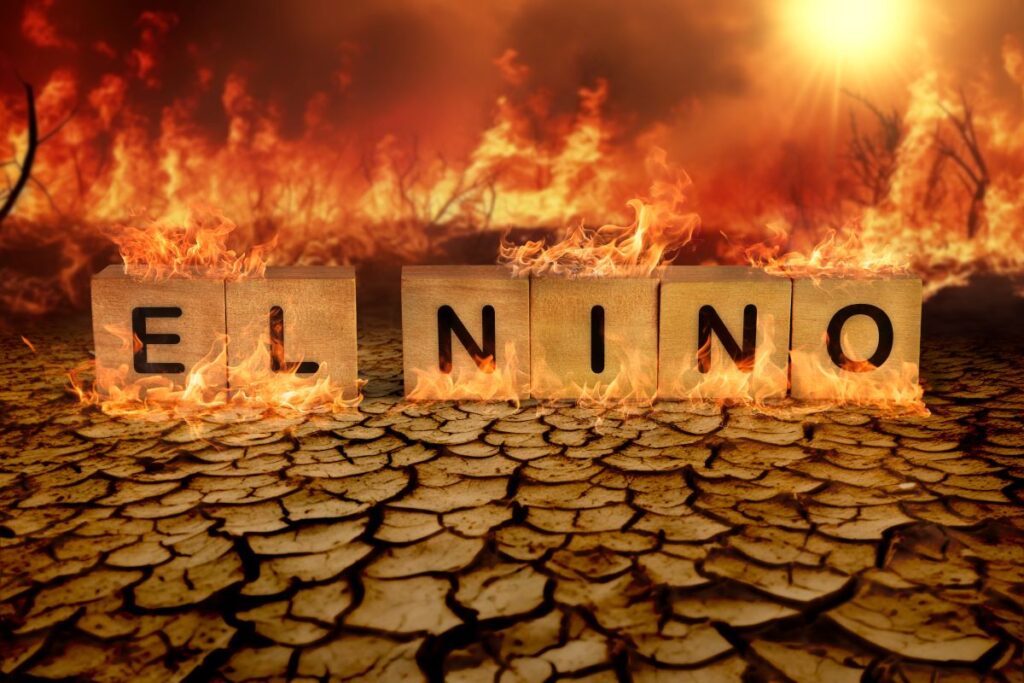
© Clintel Foundation/Friday November 24, 2023
Historical Dutch election results are a victory for climate realism

The historical victory of the PVV (Party for Freedom) in the Dutch General Elections of November 22nd was primarily linked to the theme of immigration. But let’s not forget that the PVV has also been a climate sceptic party for years now. The party doesn’t want money-consuming climate plans (i.e. CO2 reduction). Here’s what the party manifesto says:
“For decades now, we have been frightened by predictions of climate change doom. And although the projected disaster scenarios – about the world coming to an end – grew more extreme over the years, none of them ever become true.
We should stop being scared. The Netherlands is a smart country: we have the best water engineers in the world. Many years ago, our Delta Commissioner said we live in the safest delta in the world, we are well protected and there is no reason for panic.
The climate always changes and has been changing for centuries. When circumstances change, we adapt to them. We do that through sensible water management, by raising dikes when necessary and by giving rivers more space. But we should stop the hysterical reduction of CO2, an action we, a small country, wrongly think can ‘save’ the climate.
The Netherlands is responsible for less than half of a percent of the total global emission of CO2. In answer to questions of the PVV, the Minister (of Climate) admitted that his climate program with 122 measures, would only lead to a reduction of global warming by 0,000036 degrees. The amount of CO2 that The Netherlands avoids emitting with these measures, is compensated by the amount that China emits in less than one day. And the cost of all this is 28 billion euros! This has nothing to do with reality, it is all about climate ideology and delusions of grandeur.
And for this unaffordable insanity, we should change our entire way of living: our coal-fired power plants are being closed, while there are hundreds of them built in Asia as we speak. Our houses will no longer use natural gas, at the cost of tens of thousands of euros, while natural gas is the cleanest fossil fuel. Our country is being crammed with dismal wind turbines, while local residents literally get sick because of them. They want us to use heat pumps and electric cars, while our power grid – that used to be one of the most reliable in the world – can’t cope with demand. We must fly less, eat less meat; it never stops.
The PVV says: there is no way we are going to do that! The Climate Law, the Climate Agreement and all the other climate measures will go directly to the paper shredder. No more wasting of billions of euros for pointless climate hobbies, but more money for our people.
The energy bill has risen to record highs over the past few years. Many hundreds of thousands of people live in energy poverty. This year, the average energy bill will rise by many hundreds of euros. More than half of that is due to higher taxes! The Dutch energy tax on natural gas, is amongst the highest in all Europe. The Dutch are being squeezed. That’s why the PVV wants to lower the energy tax and VAT on energy.”
Five years ago, FvD (Forum for Democracy) won the local (Provincial) elections, with climate as an important theme. This year BBB (Farmer-Citizen Movement) won the Provincial Elections with their critical views on nitrogen. There are enough clues that lots of citizens have had enough of the unrelenting nagging about climate and nitrogen fertilizer, despite the massive media support of climate alarmism day after day.
There is no climate emergency
Clintel is a thinktank and is not connected to any political party. Nor have we had any involvement in party manifestos. That doesn’t mean we can’t largely agree with what the PVV has written in her party manifesto on climate and climate policy.
We state in our World Climate Declaration (now signed globally by more than 1850 scientists and experts, including two Nobel Prize winners) that there is no climate emergency, even if one acknowledges that CO2 has caused most of the warming since 1850. If there is no climate emergency, there is no need for panic in climate policy.
For years, we have been saying that the current climate policy is unfeasible and unaffordable, like Marcel Crok wrote in 2018 in the Dutch magazine Elsevier (article in Dutch). Back then, the number of 0,0003 degrees of reduction in global warming had already appeared, as a result of a 50% reduction of CO2 in The Netherlands.
The electorate has now also voted against unfeasible and unaffordable climate policies. So, it’s time for a government that stops overly ambitious climate policies. Better half-turned than completely gone astray. It’s also about time that the media adopts a more open attitude towards other views on the climate, like those of Clintel.
In his most passionate speech of the whole election campaign, Frans Timmermans (Labour Party) said, after the results were announced, that The Netherlands will abandon nobody. This advice should especially be applied to the parties on the left. They will have to become more understanding of other views on climate, on nitrogen, and on immigration. Only if they abandon their position of moral superiority will they have any chance of success in the future. Yet, in their speeches on November 22nd, there were no signs of this.
We knew that regarding climate policy “the shore will stop the ship” at some point. In ten years’ time, we might conclude that in The Netherlands, that point was November 22nd 2023.
You can also find this article here on the Clintel website.
Steven Koonin in The Netherlands: the science is not settled

The science is not settled, is the central message in prof. Steven Koonin’s climate bestseller: Unsettled. Koonin, former Undersecretary for Science in the Obama Administration (2009-2011), demonstrates in his book that the climate problem is often exaggerated and that the proposed energy transition is unfeasible. On the occasion of the launch of the Dutch translation of Unsettled (initiated by Clintel), Koonin visited The Netherlands and gave two presentations.
On September 27th Koonin gave a presentation on his book (video here) in a fully booked theatre and on September 28th he participated in a energy symposium titled “Towards a more graceful energy transition” amd aimed at professionals working on the energy transition (video here).
Besides Koonin, Dutch energy expert Theo Wolters gave a presentation about the requirements of an efficient carbon free energy system in The Netherlands (video here), while German journalist Alexander Wendt spoke about the dramatic consequences of climate policy in Germany (video here).
Read the introductory article on Koonin’s visit: here
Nic Lewis debunks James Hansen’s overheated new claims

James Hansen’s latest alarmist paper Global warming in the pipeline has already been heavily criticized in a lengthy comment by Michael Mann. However Mann does not deal with Hansen’s surprisingly high (4.8°C) new estimate of equilibrium climate sensitivity (ECS). Nic Lewis has now also written a critique of Hansen’s paper: “I do not consider that Hansen’s climate sensitivity estimation properly assesses and fairly reflects all the available relevant evidence. Unfortunately, Hansen estimates ECS using only paleoclimate proxy-derived evidence, which generally varies considerably according to the proxies involved and to the methods used to interpret them. This opens the door for biased (cherry picked) assessments. Although I respect Hansen’s ability and considerable scientific contributions, in my view papers he leads are increasingly strongly biased towards overheated projections and dire conclusions.”
Read the entire article: here
Are El Niño’s becoming stronger?

The current exceptionally strong El Niño has revived discussion of a question which comes up whenever the phenomenon recurs every two to seven years: are stronger El Niños caused by global warming? Ralph Alexander has devoted a new article to this subject and concludes: “While recent El Niño events suggest that in fact they are (stronger), a look at the historical record shows that even stronger El Niños occurred in the distant past.”
“A team of German paleontologists established a complete record of El Niño events going back 20,000 years, by examining marine sediment cores drilled off the coast of Peru. The cores contain an El Niño signature in the form of tiny, fine-grained stone fragments, washed into the sea by multiple Peruvian rivers following floods in the country caused by heavy El Niño rainfall. You can see that the many strong El Niños approximately 2,000 and 10,000 years ago, were several times stronger than current El Niños. Those two periods were warmer than today as well, being the Roman Warm Period and the Holocene Thermal Maximum, respectively. So there is nothing remarkable about recent strong El Niños.”
Read the full article: here
Covid-19, Climate and manufactured Consensus

In a recent article Judith Curry draws parallels between Covid-19 and the climate: “A manufactured consensus on a complex, wicked problem such as climate change or Covid-19 leads to the naivete of thinking that these are simple risks, and the hubris of thinking that we can control the risk. Even beyond the technical issues, greater realism is needed about the uncertainties and politics underpinning the pursuit of control for wicked societal problems.
The pandemic illustrates that our tools for acting on a complex global problem—experts, precise scientific metrics, computer models, enforced restrictions— have resulted in much less than the desired quality of control. The global energy transition and worldwide transformations to sustainability are far more challenging than the global COVID-19 pandemic. The modernist paradigm of mastery, planning, and optimization is not appropriate for the wicked problems of the twenty-first century.”
“With regards to climate change, what is going on represents more than politically motivated consensus enforcement and cancel culture. Climate change has become a secular religion, rife with dogma, heretics and moral-tribal communities. The secular religion of climate change raises concerns that are far more fundamental than the risks of bad policy. At risk is the fundamental virtues of the Scientific Revolution and the freedom to question authority.”
Read the full article by Judith Curry: here
Clintel now also a registered 501(c)3 organisation in the USA

Good news! Thanks to the help of an American friend of Clintel, we have been able to set up a US registered 501(c)3 organisation under the name Climate Intel. This means that US citizens can now do a tax deductible donation to Climate Intel and support the work of Clintel. Several options for donations can be found here and here.
For more information contact our office: office@clintel.org
Clintel is an Amsterdam (The Netherlands) based thinktank founded in 2019 by Dutch emeritus professor Guus Berkhout and science writer Marcel Crok. Clintel operates as a climate science and climate policy watchdog. In its first year it launched the World Climate Declaration, stating firmly “there is no climate emergency”. That declaration is now signed by more than 1850 scientists and experts.
Clintel wants to be independent from governments as these are the main funders of climate science and policy. In practice it means we need broad support from citizens and small and medium enterprises around the world.
For more information, please contact Marcel Crok, +31 6 16 236275, marcel.crok@clintel.org
You can support us by becoming Friends of Clintel or you can make a one-time donation.
Many thanks in advance for your support!
Want to subscribe to our newsletter?
Copyright © 2023 Clintel Foundation.
You can mail your reactions to this newsletter to office@clintel.org
